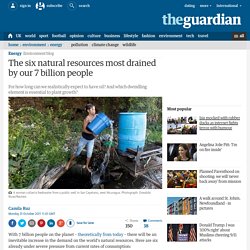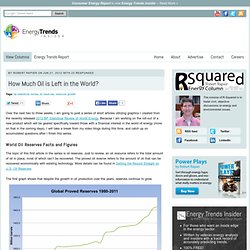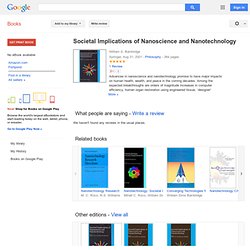

The six natural resources most drained by our 7 billion people. With 7 billion people on the planet – theoretically from today – there will be an inevitable increase in the demand on the world's natural resources.

Here are six already under severe pressure from current rates of consumption: 1. Water Freshwater only makes 2.5% of the total volume of the world's water, which is about 35 million km3. But considering 70% of that freshwater is in the form of ice and permanent snow cover and that we only have access to 200,000km3 of freshwater overall, it isn't surprising that demand for water could soon exceed supply. 2. The fear of reaching peak oil continues to haunt the oil industry. 3. A similar picture to oil exists for natural gas, with enough gas in proven reserves to meet 58.6 years of global production at the end of 2010. 4.
Without this element, plants cannot grow. 5.
Energy Policy - The Rimini Protocol an oil depletion protocol: Heading off economic chaos and political conflict during the second half of the age of oil. How Much Oil is Left in the World? Over the next two to three weeks, I am going to post a series of short articles utilizing graphics I created from the recently released 2012 BP Statistical Review of World Energy.

Because I am working on the roll-out of a new product which will be geared specifically toward those with a financial interest in the world of energy (more on that in the coming days), I will take a break from my video blogs during this time, and catch up on accumulated questions after I finish this series. World Oil Reserves Facts and Figures The topic of this first article in the series is oil reserves. Just to review, an oil resource refers to the total amount of oil in place, most of which can’t be recovered. The proved oil reserve refers to the amount of oil that can be recovered economically with existing technology. Over the past 30 years, 90% of the reserves additions have come from OPEC countries.
In 1982, OPEC introduced a system of production quotas based partly on the oil reserves in each country.
Running Responsibly: BioMoGo. Conflict Minerals, Rebels and Child Soldiers in Congo. Into Eternity: A Film for the Future (2010. Fossil fuels. Eben Bayer: Are mushrooms the new plastic? Societal Implications of Nanoscience and Nanotechnology. Dr.

Mihail C. Roco is a senior advisor on nanotechnology for the National Science Foundation, as well as chair on the Subcommittee on Nanoscale Science, Engineering and Technology of the U.S. National Science and Technology Council. William Sims Bainbridge earned his doctorate in sociology from Harvard University, with a dissertation on the social origins of the space program, which became his first of 18 published scientific books (not counting edited volumes). He taught sociology, including the sociology of science and technology as well as theory and research methods, in major universities for 20 years.